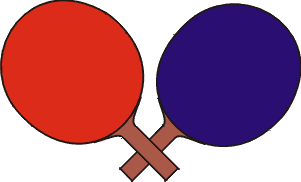
Benefits of Ping Pong
• Playing improves hand-eye coordination and it stimulates mental alertness, concentration and tactical strategy. This makes it the perfect game for young people to sharpen reflexes, and for older people to refine tactics.
• Develops mental acuity. The speed, spin and placement of the ball are crucial in table tennis, and practiced players are highly skilled in both creating and solving puzzles involving these three attributes.
• Improves reflexes. Due to the fast-paced, short-distance nature of the sport, both gross and fine muscle movements are improved. The game is distinguished by bursts of exertion and recovery, leading to fast-twitch muscle development.
• Improves balance. Staying balanced and being able to quickly change direction are key to being successful in a ping pong rally. This is especially important for the elderly.
• It’s easy on the joints. Have you had knee surgery, back problems, tired of twisting your ankles? Try table tennis. It’s a great way to improve your leg, arm and core strength without overtaxing your joints.
• Burns calories. A 150-pound person can burn 272 calories by playing table tennis for an hour. Considering the fact that the sport is entertaining and addictive, it can be a fun and easy way to burn calories.
Here are some more
• Offers a social outlet. Whether you play in the community center or at home with friends, table tennis offers a great way to bond with other people while you lose weight. Because young and old people can play the game, it can help improve communication and build relationships, irrespective of age. Playing at home with siblings or parents can bring family members closer and enable them to spend more quality time with each other.
• Keeps your brain sharp. Alzheimer’s Weekly reports a clear increase in motor skills and cognitive awareness from playing table tennis, after a series of preliminary clinical studies in Japan found that table tennis markedly increases the flow of blood to the brain, and could possibly even prevent dementia.
• Improves coordination. Following the ping pong ball as it moves quickly toward you, and following its trajectory as your opponent hits it helps improve hand-eye coordination.
• Stimulates various different parts of the brain. By anticipating an opponent’s shot, a player uses the prefrontal cortex for strategic planning. The aerobic exercise from the physical activity of the game stimulates the hippocampus, the part of the brain that is responsible for allowing us to form and retain long-term facts and events.
